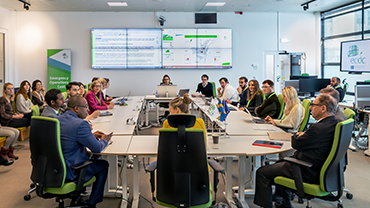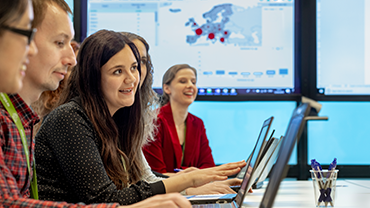Simulation Exercises and emergency preparedness: An interview with Dr Muhammed Al Azebi
We talked to Dr Muhammed Al Azebi during a two-day training workshop on how to use Simulation Exercises (SimEx) to enhance emergency preparedness and response plans. The training was organised under the EU Initiative on Health Security by ECDC in Stockholm, Sweden.

Dr Al Azebi (MD) graduated from the Faculty of Medicine at the University of Tripoli in Libya in 2015. He then worked for three years as a paediatrician, before being appointed Director for the newly established Public Health Emergency Operations Center at Libya’s National Center for Disease Control.
Why should field epidemiologists apply Simulation Exercises in their work?
A good field epidemiologist has to work according to plans. In order to be prepared, you must have plans, you must be trained, and you must be able to verify if your plans will work during an actual outbreak. In my opinion, anyone aspiring to be a field epidemiologist should be trained in implementing standard operational procedures and plans before entering the field.
It is very important to first practise everything, so you know how to act effectively before facing a real emergency. It is the same for us with a medical background. There is a big difference between those who have a lot of experience in a specific field and have been trained well, compared to those who do a task for the first time. So, the concept of Simulation Exercise plays a major role in field of epidemiology.
Can you provide a practical example from your own work where Simulation Exercises played an important role?
In February 2020 – during the early days of COVID-19 – even our government did not believe that COVID-19 could affect our country, Libya. They believed that the disease was located in China, and that we were safe as we did not have any direct flights from China. So, the risk was considered very low.
At the National Center for Disease Control (NCDC), we decided to do a drill. We had one doctor from Europe who had a fever, let’s say 38 degrees Celsius. We declared that we had a suspected (COVID-19) case. Our crisis committee organised an urgent meeting with our Director, and we contacted all the stakeholders. We basically tested what would happen if a real case came along. Well, nothing happened. The doctor was kept in the airport for three hours. No one came in close contact with him. When we took the swab, we knew that his test would be negative. But we kept acting like there is a necessity to test.
The players who were supposed to isolate the case refused to accept him or admit him to a doctor, and the ambulance refused to take him. So, it showed that there were a lot of gaps. It also showed that we were not ready to handle this kind of a situation. Just one month after, we had our first real case. It was an elderly man from a Gulf country. In the month leading up to that, we performed a lot of procedures to prepare ourselves, including developing response plans and establishing an isolation centre to isolate potential cases. These procedures were very useful in our preparation.
Why is participating in a Simulation Exercise important for emergency preparedness?
We have a mandate to draft plans and standard operating procedures. We keep these plans ready, but what happens if there is an incident? We try to implement them. In the plans we put the names of all the stakeholders and their contact details. If an incident happens, we should call and inform them that we have a COVID-19 outbreak. But to ensure that these plans work, you need to run exercises with them.
You have to be well-trained in order to be well-prepared. It’s like in the emergency units in the hospitals. You don’t have any time to think; you need to act. So, in order to act, you have to be well-prepared and well-trained. During an outbreak, we have to be able to act immediately. For us as public health professionals, the threat is anything that can harm people. In order to be prepared, you need to know who your stakeholders are, the hierarchy and the chain of command, because otherwise you will end up in a very chaotic situation and you will lose a lot of lives and resources.
Who are the key players that should be involved and learn from Simulation Exercises?
It all depends on the type of exercise you are going to implement and what your aims and objectives are. For example, if your objective is to test the connectivity and coordination between health authorities and law enforcement authorities, it is important that law enforcement personnel are involved in all stages of the training. So, it really depends on the aims and objectives of the exercise you are conducting.






